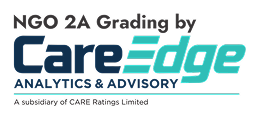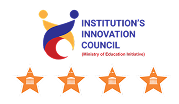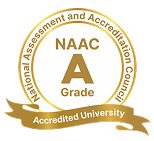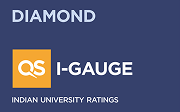ACPC Offline Admission Process Click here
Examination Result Click here to know more

ACPC Offline Admission Process Click here
Examination Result Click here to know more

ADMISSION ENQUIRY - 2026
Program Details
Fees
Tuition Fees
₹ 70000
Contact No.:
+91- (M) 9825990759
+91- (M) 9925029686
+91- (M) 9909055081
admission.ampics@ganpatuniversity.ac.in
Eligibility
Program Outcome
| PO-1 | Computational Knowledge: Apply knowledge of computing fundamentals, computing specialization, mathematics, and domain knowledge appropriate for the computing specialization to the abstraction and conceptualization of computing models from defined problems and requirements. |
| PO-2 | Problem Analysis: Identify, formulate, research literature, and solve complex computing problems reaching substantiated conclusions using fundamental principles of mathematics, computing sciences, and relevant domain disciplines |
| PO-3 | Design /Development of Solutions: Design and evaluate solutions for complex computing problems, and design and evaluate systems, components, or processes that meet specified needs with appropriate consideration for public health and safety, cultural, societal, and environmental considerations. |
| PO-4 | Conduct investigations of complex Computing problems: Use research-based knowledge and research methods including design of experiments, analysis and interpretation of data, and synthesis of the information to provide valid conclusions |
| PO-5 | Modern Tool Usage: Create, select, adapt and apply appropriate techniques, resources, and modern computing tools to complex computing activities, with an understanding of the limitations. |
| PO-6 | Professional Ethics: Understand and commit to professional ethics and cyber regulations, responsibilities, and norms of professional computing practices. |
| PO-7 | Life-long Learning: Recognize the need, and have the ability, to engage in independent learning for continual development as a computing professional. |
| PO-8 | Project management and finance: Demonstrate knowledge and understanding of the computing and management principles and apply these to one’s own work, as a member and leader in a team, to manage projects and in multidisciplinary environments. |
| PO-9 | Communication Efficacy: Communicate effectively with the computing community, and with society at large, about complex computing activities by being able to comprehend and write effective reports, design documentation, make effective presentations, and give and understand clear instructions |
| PO-10 | Societal and Environmental Concern: Understand and assess societal, environmental, health, safety, legal, and cultural issues within local and global contexts, and the consequential responsibilities relevant to professional computing practices. |
| PO-11 | Individual and Team Work: Function effectively as an individual and as a member or leader in diverse teams and in multidisciplinary environments. |
| PO-12 | Innovation and Entrepreneurship: Identify a timely opportunity and using innovation to pursue that opportunity to create value and wealth for the betterment of the individual and society at large. |
Program Educational Objectives (PEO)
| 1 | Utilize the acquired knowledge throughout the program to identify, formulate, and effectively solve real-life problems, consistently enhancing core competencies through continuous learning and upgrading. |
| 2 | Apply ethical and managerial principles in collaborative team environments, demonstrating a sense of responsibility and stewardship towards societal well-being. |
| 3 | Acquire proficiency in diverse programming skills to craft foundational software products, serving as a basis for subsequent application development within the realms of computer science and cutting-edge technology. |
| 4 | Develop into globally competent computer professionals with leadership acumen and expertise in specific domains, capable of creating innovative solutions across diverse disciplines. |
Syllabus
| Subject Name | Subject Type | Subject Code | Subject Credit | Subject Comment | Attachments |
|---|---|---|---|---|---|
| LOGIC DEVELOPMENT WITH PROGRAMMING-I (JUNE 2024) | Regular | U31A1LDP | 4 | JUNE 2024 |
Read More |
| BCA Hon. Semester - I Teaching Scheme | Regular | Teaching Scheme | - |
Read More |
|
| BASIC WEB PROGRAMMING (JUNE 2024) | Regular | U31A2BWP | 4 | JUNE 2024 |
Read More |
| COMPUTER ORGANIZATION AND ARCHITECTURE (JUNE 2024) | Elective | U31B3COA | 4 | JUNE 2024 |
Read More |
| DIGITAL LOGIC (JUNE 2024) | Elective | U31B3DL | 4 | JUNE 2024 |
Read More |
| DATA ANALYTICS-I (JUNE 2024) | Regular | U31C4DA | 4 | JUNE 2024 |
Read More |
| COMMUNICATION SKILLS (JUNE 2024) | Regular | U31D5CS | 2 | JUNE 2024 |
Read More |
| PRESENTATION SKILL (JUNE 2024) | Regular | U316EPS | 2 | JUNE 2024 |
Read More |
| INDIAN PHILOSOPHY FOR LEADERSHIP | Open | U31G6IPL | 2 | JUNE 2025 |
Read More |
| OPERATING SYSTEM (JUNE 2024) | Regular | U31F7OS | 2 | JUNE 2024 |
Read More |
| Subject Name | Subject Type | Subject Code | Subject Credit | Subject Comment | Attachments |
|---|---|---|---|---|---|
| LOGIC DEVELOPMENT WITH PROGRAMMING-II (JUNE 2024) | Regular | U32A1LDP | 4 | JUNE 2024 |
Read More |
| BCA Hon. Semester - II Teaching Scheme | Open | Teaching Scheme | - |
Read More |
|
| ADVANCE WEB PROGRAMMING (JUNE 2024) | Regular | U32A2AWP | 4 | JUNE 2024 |
Read More |
| SOFTWARE ANALYSIS AND DESIGN (JUNE 2024) | Elective | U32B3SAD | 4 | JUNE -2024 |
Read More |
| SOFTWARE ENGINEERING (JUNE 2024) | Elective | U32B3SE | 4 | JUNE - 2024 |
Read More |
| DATA ANALYTICS-II (JUNE 2024) | Regular | U32C4DA | 4 | JUNE - 2024 |
Read More |
| EFFECTIVE WRITING SKILLS (JUNE 2024) | Regular | U32D5EWS | 2 | JUNE - 2024 |
Read More |
| STARTUP AND ENTREPRENEURSHIP (JUNE 2024) | Regular | U32E6SEP | 2 | JUNE-2024 |
Read More |
| SOFT SKILLS (JUNE 2024) | Regular | U32F7SS | 2 | JUNE - 2024 |
Read More |
| Subject Name | Subject Type | Subject Code | Subject Credit | Subject Comment | Attachments |
|---|---|---|---|---|---|
| BCA Hon. Semester - III Teaching Scheme | Open | Teaching Scheme | - | 2025-2026 |
Read More |
| OBJECT ORIENTED CONCEPTS AND PROGRAMMING | Regular | U33A1OOP | 4 | June 2024 |
Read More |
| DATA AND FILE STRUCTURE | Regular | U33A2DFS | 4 | June 2024 |
Read More |
| DATABASE MANAGEMENT SYSTEMS | Regular | U33A3DBM | 4 | June 2024 |
Read More |
| DISCRETE MATHEMATICS AND STATISTICAL COMPUTATION | Regular | U33C4DMS | 4 | June 2024 |
Read More |
| EMPLOYABILITY ENHANCEMENT SKILLS | Regular | U33D5EES | 2 | June 2024 |
Read More |
| SYSTEM MAINTENANCE | Regular | U33E6SM | 2 | June 2024 |
Read More |
| MANAGEMENT LESSONS FROM BHAGAVAD GITA | Elective | U33F7LBG | 2 | June 2024 |
Read More |
| Subject Name | Subject Type | Subject Code | Subject Credit | Subject Comment | Attachments |
|---|---|---|---|---|---|
| BCA Hon. Semester - IV Teaching Scheme | Open | Teaching Scheme | - | 2025-2026 |
Read More |
| OPEN SOURCE TECHNOLOGY | Regular | U34A1OST | 2 | June 2024 |
Read More |
| COMPUTER NETWORK | Regular | U34A2CN | 4 | June 2024 |
Read More |
| ADVANCED DATABASE MANAGEMENT SYSTEM | Regular | U34A3ADB | 4 | June 2024 |
Read More |
| R PROGRAMMING | Elective | U34B4RP | 4 | June 2024 |
Read More |
| INTRODUCTION OF PYTHON PROGRAMMING | Elective | U34B4IPP | 4 | June 2024 |
Read More |
| ENVIRONMENT AND DISASTER MANAGEMENT | Regular | U34D5EDM | 2 | June 2024 |
Read More |
| PROFESSIONAL DEVELOPMENT SKILLS | Regular | U34E6PDS | 2 | June 2024 |
Read More |
| EMERGING TECHNOLOGIES | Regular | U34F7ET | 2 | June 2024 |
Read More |
| Subject Name | Subject Type | Subject Code | Subject Credit | Subject Comment | Attachments |
|---|---|---|---|---|---|
| BCA Hon. Semester - V Teaching Scheme | Regular | Teaching Scheme | - | June 2024 |
Read More |
| FUNDAMENTALS OF ANDROID DEVELOPMENT | Regular | U35A1FAD | 4 | June 2024 |
Read More |
| ADVANCED WEB TECHNOLOGY | Regular | U35A2AWT | 4 | June 2024 |
Read More |
| REACT JS DEVELOPMENT | Regular | U35A3RJD | 4 | June 2024 |
Read More |
| FUNDAMENTAL OF CLOUD COMPUTING | Elective | U35B4FCC | 4 | June 2024 |
Read More |
| NETWORK SECURITY | Elective | U35B4NS | 4 | June 2024 |
Read More |
| SOFTWARE TESTING AND QUALITY ASSURANCE | Elective | U35B5SQA | 4 | June 2024 |
Read More |
| SOFTWARE PROJECT MANAGEMENT | Elective | U35B5SPM | 4 | June 2024 |
Read More |
| DIGITAL AND SOCIAL MEDIA MARKETING | Regular | U35E6DSM | 2 | June 2024 |
Read More |
| Subject Name | Subject Type | Subject Code | Subject Credit | Subject Comment | Attachments |
|---|---|---|---|---|---|
| BCA Hon. Semester - VI Teaching Scheme | Regular | Teaching Scheme | - | June 2024 |
Read More |
| NEXT JS DEVELOPMENT | Regular | U36A1NJD | 4 | June 2024 |
Read More |
| DATA ANALYTICS - III | Regular | U36A2DA | 4 | June 2024 |
Read More |
| INTRODUCTION TO UI/UX DESIGN | Regular | U36A3ITU | 4 | June 2024 |
Read More |
| FUNDAMENTALS OF DATACENTER | Elective | U36B4FOD | 4 | June 2024 |
Read More |
| INTRODUCTION TO CYBER SECURITY | Elective | U36B4ICS | 4 | June 2024 |
Read More |
| LIFE SKILLS AND PERSONALITY DEVELOPMENT | Regular | U36D5LPD | 4 | June 2024 |
Read More |
| SYSTEM DEVELOPMENT PROJECT - I | Regular | U36E6SDP1 | 4 | June 2024 |
Read More |






